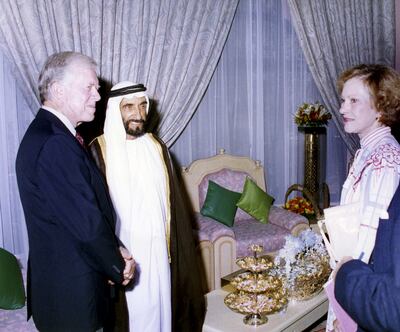News that former US president Jimmy Carter made the decision to go into hospice last month generated a flood of appreciative commentary about his life and work. It is important to reflect on both.
When he lost his reelection bid to Ronald Reagan in 1980, many deemed his presidency a failure. Inflation was at record highs, consumer confidence was at an all-time low, and Americans, still recovering from our humiliating defeat in Vietnam, were being traumatised anew by the prolonged captivity of US embassy staff held hostage in Iran. The criticisms were largely unfair, since the problems Mr Carter confronted were not of his making and were beyond his ability to control.
While most former presidents have either capitalised on their fame or faded into obscurity, Mr Carter chose a different path. He made the conscious decision to invest his prestige in doing work for others through public service.
I had the great fortune to get to know Jimmy Carter
For example, almost immediately upon leaving the White House, Mr Carter and his wife, Rosalynn, embraced and became closely identified with Habitat for Humanity, a non-profit volunteer project that builds low-income housing and repairs homes in areas hit by natural disasters. They volunteered in building projects and gave a public face to the group that, during their association with Habitat, built more than 100,000 homes for over one and a half million people. Even into their 70s, Mr and Mrs Carter were devoting at least one week a year to Habitat projects. He became so identified with the group that when thinking of him more Americans probably called to mind Mr Carter in denim with hammer in hand than Mr Carter in a suit in the White House.
In 1982, the former president launched the Carter Centre that described its role as “waging peace, fighting disease, and building hope”. Leading many of the Centre’s initiatives, he travelled the globe monitoring elections, negotiating peace in troubled areas of the world and launching programmes to help eradicate diseases or providing expertise to farmers to increase yield and improve their lives.
I had the great fortune to get to know Jimmy Carter. Among the most memorable of those encounters was a lengthy interview I had with him about his life and his views on a range of Middle East topics and the opportunity to speak alongside him on a panel at the Carter Centre on Israel’s treatment of Palestinian Christians.
The Carter I encountered in my dealings with him validated the image the public had grown to know and love about this man. He was humble, honest and thoughtful. He accepted blame and deflected praise.
In our first meeting, I told him how I had hired a pilot to fly one night around Camp David while he was meeting Israeli and Egyptian leaders there. The pilot, careful to remain outside the restricted perimeter of the area, carried a lit sign that read “Palestinians are the key to peace”. When I told him this, he smiled and said: “That was you! I wondered who did that. It was an important reminder.” He went on to describe his frustration that he hadn’t been able to deliver more for Palestinians and noted the pushback, both domestically and in Israel, he received for his efforts. (He had written much the same to me in a letter he sent to me in 1980 before leaving the White House.) He was also critical of the extent to which the US had continued to “look the other way”, allowing the Israelis to deepen the occupation and further impede any hope for a just peace.
In further conversations, while acknowledging that former Iraqi president Saddam Hussein was “a callous and inept leader”, he was deeply critical of the US-led sanctions regime that he noted had contributed to the deaths of hundreds of thousands Iraqi children. He called the sanctions “counterproductive”, saying that they played into the hands of the regime.
Most revealing of the character of the man was his response to me when, in an interview, I complimented his work in fighting disease in Africa. He deflected the praise and said that while the accolades were given to the Carter Centre, if it hadn’t been for the support given by the UAE Founding Father, the late Sheikh Zayed bin Sultan Al Nahyan, much of their work in Africa could not have been done.
It is with these characteristics of humility, honesty, and thoughtful self-reflection and criticism, that Mr Carter has established his well-earned reputation as “America’s greatest ex-president”.
With the announcement that Mr Carter would enter hospice, I was reminded of a quote from a talk he gave to his church in 2019. He said: “I didn’t ask God to let me live, but I asked God to give me a proper attitude towards death. And I found that I was absolutely and completely at ease with death.”
This is his legacy. A great former president who taught us how to live a life for others and, as he approaches his end, is teaching us how to die with grace. His has been a life well-lived.
Global state-owned investor ranking by size
|
1.
|
United States
|
|
2.
|
China
|
|
3.
|
UAE
|
|
4.
|
Japan
|
|
5
|
Norway
|
|
6.
|
Canada
|
|
7.
|
Singapore
|
|
8.
|
Australia
|
|
9.
|
Saudi Arabia
|
|
10.
|
South Korea
|
Groom and Two Brides
Director: Elie Semaan
Starring: Abdullah Boushehri, Laila Abdallah, Lulwa Almulla
Rating: 3/5
Omar Yabroudi's factfile
Born: October 20, 1989, Sharjah
Education: Bachelor of Science and Football, Liverpool John Moores University
2010: Accrington Stanley FC, internship
2010-2012: Crystal Palace, performance analyst with U-18 academy
2012-2015: Barnet FC, first-team performance analyst/head of recruitment
2015-2017: Nottingham Forest, head of recruitment
2018-present: Crystal Palace, player recruitment manager
Tiger%20Stripes%20
%3Cp%3E%3Cstrong%3EDirector%3A%3C%2Fstrong%3E%20Amanda%20Nell%20Eu%C2%A0%3C%2Fp%3E%0A%3Cp%3E%3Cstrong%3EStars%3A%3C%2Fstrong%3E%20Zafreen%20Zairizal%2C%20Deena%20Ezral%20and%20Piqa%3C%2Fp%3E%0A%3Cp%3E%3Cstrong%3ERating%3A%3C%2Fstrong%3E%204.5%3C%2Fp%3E%0A
PROFILE OF HALAN
Started: November 2017
Founders: Mounir Nakhla, Ahmed Mohsen and Mohamed Aboulnaga
Based: Cairo, Egypt
Sector: transport and logistics
Size: 150 employees
Investment: approximately $8 million
Investors include: Singapore’s Battery Road Digital Holdings, Egypt’s Algebra Ventures, Uber co-founder and former CTO Oscar Salazar
Victims%20of%20the%202018%20Parkland%20school%20shooting
%3Cp%3EAlyssa%20Alhadeff%2C%2014%3C%2Fp%3E%0A%3Cp%3EScott%20Beigel%2C%2035%0D%3C%2Fp%3E%0A%3Cp%3EMartin%20Duque%2C%2014%3C%2Fp%3E%0A%3Cp%3ENicholas%20Dworet%2C%2017%3C%2Fp%3E%0A%3Cp%3EAaron%20Feis%2C%2037%3C%2Fp%3E%0A%3Cp%3EJaime%20Guttenberg%2C%2014%0D%3C%2Fp%3E%0A%3Cp%3EChris%20Hixon%2C%2049%0D%3C%2Fp%3E%0A%3Cp%3ELuke%20Hoyer%2C%2015%3C%2Fp%3E%0A%3Cp%3ECara%20Loughran%2C%2014%0D%3C%2Fp%3E%0A%3Cp%3EGina%20Montalto%2C%2014%0D%3C%2Fp%3E%0A%3Cp%3EJoaquin%20Oliver%2C%2017%0D%3C%2Fp%3E%0A%3Cp%3EAlaina%20Petty%2C%2014%0D%3C%2Fp%3E%0A%3Cp%3EMeadow%20Pollack%2C%2018%3C%2Fp%3E%0A%3Cp%3EHelena%20Ramsay%2C%2017%0D%3Cbr%3E%0D%3C%2Fp%3E%0A%3Cp%3EAlex%20Schachter%2C%2014%0D%3C%2Fp%3E%0A%3Cp%3ECarmen%20Schentrup%2C%2016%0D%3C%2Fp%3E%0A%3Cp%3EPeter%20Wang%2C%2015%3Cbr%3E%3C%2Fp%3E%0A
COMPANY%20PROFILE
%3Cp%3E%3Cstrong%3ECompany%20name%3A%3C%2Fstrong%3E%20Sav%3Cbr%3E%3Cstrong%3EStarted%3A%3C%2Fstrong%3E%202021%3Cbr%3E%3Cstrong%3EFounder%3A%3C%2Fstrong%3E%20Purvi%20Munot%3Cbr%3E%3Cstrong%3EBased%3A%3C%2Fstrong%3E%20Dubai%3Cbr%3E%3Cstrong%3EIndustry%3A%3C%2Fstrong%3E%20FinTech%3Cbr%3E%3Cstrong%3EFunding%3A%3C%2Fstrong%3E%20%24750%2C000%20as%20of%20March%202023%3Cbr%3E%3Cstrong%3EInvestors%3A%3C%2Fstrong%3E%20Angel%20investors%3C%2Fp%3E%0A
The five pillars of Islam
1. Fasting
2. Prayer
3. Hajj
4. Shahada
5. Zakat
Brief scoreline
Switzerland 0
England 0
Result: England win 6-5 on penalties
Man of the Match: Trent Alexander-Arnold (England)
White hydrogen: Naturally occurring hydrogen
Chromite: Hard, metallic mineral containing iron oxide and chromium oxide
Ultramafic rocks: Dark-coloured rocks rich in magnesium or iron with very low silica content
Ophiolite: A section of the earth’s crust, which is oceanic in nature that has since been uplifted and exposed on land
Olivine: A commonly occurring magnesium iron silicate mineral that derives its name for its olive-green yellow-green colour
Tips for newlyweds to better manage finances
All couples are unique and have to create a financial blueprint that is most suitable for their relationship, says Vijay Valecha, chief investment officer at Century Financial. He offers his top five tips for couples to better manage their finances.
Discuss your assets and debts: When married, it’s important to understand each other’s personal financial situation. It’s necessary to know upfront what each party brings to the table, as debts and assets affect spending habits and joint loan qualifications. Discussing all aspects of their finances as a couple prevents anyone from being blindsided later.
Decide on the financial/saving goals: Spouses should independently list their top goals and share their lists with one another to shape a joint plan. Writing down clear goals will help them determine how much to save each month, how much to put aside for short-term goals, and how they will reach their long-term financial goals.
Set a budget: A budget can keep the couple be mindful of their income and expenses. With a monthly budget, couples will know exactly how much they can spend in a category each month, how much they have to work with and what spending areas need to be evaluated.
Decide who manages what: When it comes to handling finances, it’s a good idea to decide who manages what. For example, one person might take on the day-to-day bills, while the other tackles long-term investments and retirement plans.
Money date nights: Talking about money should be a healthy, ongoing conversation and couples should not wait for something to go wrong. They should set time aside every month to talk about future financial decisions and see the progress they’ve made together towards accomplishing their goals.




















